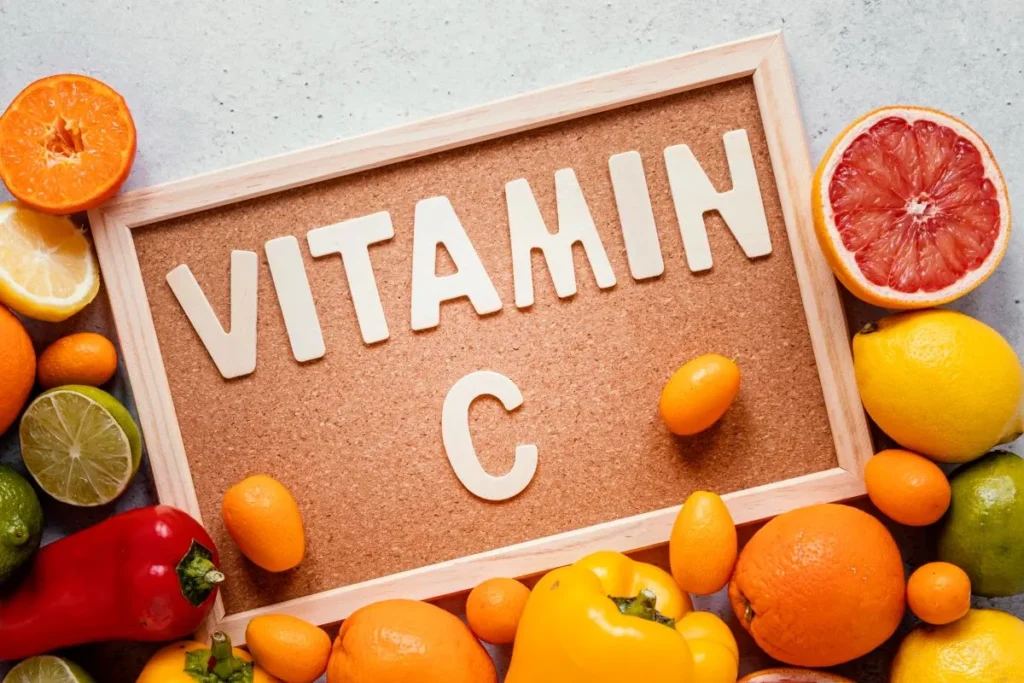Introduction:
Welcome to the world of vitamin C, a powerful nutrient often hailed as the cornerstone of good health. From boosting our immune system to enhancing our skin’s radiance, vitamin C plays many roles in keeping us healthy and vibrant. But how much do we know about this essential vitamin? Join me on a journey as we delve into the Guide to Vitamin C, uncovering its importance, sources, and benefits, and busting some common myths along the way.
Importance of Vitamin C:
Vitamin C, also known as ascorbic acid, is a water-soluble vitamin that is crucial for various bodily functions. One of its primary roles is acting as an antioxidant, which means it helps protect cells from damage caused by free radicals. Free radicals are unstable molecules that can lead to oxidative stress, a process linked to aging, inflammation, and various chronic diseases.



Furthermore, vitamin C is essential for the synthesis of collagen, a protein that forms the structural framework of our skin, bones, and connective tissues. Collagen is responsible for maintaining the strength and elasticity of these tissues, making Vitamin C indispensable for healthy skin, wound healing, and overall tissue repair.
What does vitamin C do for your body?
Vitamin C, also known as ascorbic acid, plays several vital roles in the human body:
Antioxidant Protection: Vitamin C, a potent antioxidant, neutralizes harmful free radicals, averting oxidative damage to cells and tissues.
Vitamin C shields against oxidative stress, lowering the risk of chronic diseases like heart disease, cancer, and diabetes.
Collagen Synthesis: Vitamin C is crucial for making collagen, which supports skin, bones, blood vessels, and connective tissues. Vitamin C is vital for skin health, wound healing, and tissue repair by supporting collagen strength and elasticity.
Immune Support: Vitamin C plays a crucial role in supporting the immune system by stimulating the production and function of white blood cells, which are essential for fighting off infections and illnesses. Adequate intake of vitamin C may help reduce the duration and severity of colds, flu, and other respiratory infections.
Iron Absorption: Vitamin C enhances the absorption of non-heme iron, the type of iron found in plant-based foods such as fruits, vegetables, and fortified grains. Vitamin C aids in iron absorption, preventing anemia, and supporting healthy red blood cell formation.
Wound Healing: It is involved in the synthesis of collagen and other proteins that are essential for wound healing and tissue repair. Vitamin C speeds healing by aiding blood vessel formation and supporting skin cell growth, reducing infection risk.
What foods have vitamin C?
Vitamin C is plentiful in many foods, especially fruits and vegetables. Some of the best food sources of Vitamin C include:
- Citrus Fruits: Oranges, lemons, limes, grapefruits, and tangerines are all rich in Vitamin C.
- Berries: Strawberries, raspberries, blueberries, blackberries, and cranberries are excellent sources of Vitamin C.
- Kiwi: This small, fuzzy fruit is packed with Vitamin C, providing more than the daily recommended intake in just one serving.
- Bell Peppers: Red, green, and yellow bell peppers are loaded with Vitamin C, with red peppers containing the highest amount.
- Broccoli: This cruciferous vegetable is not only rich in Vitamin C but also provides a host of other nutrients and health benefits.
- Brussels Sprouts: These mini cabbage-like vegetables are another excellent source of Vitamin C.
- Kale: This leafy green vegetable is packed with nutrients, including Vitamin C.
- Spinach: Spinach is a nutrient-dense leafy green that provides significant Vitamin C.
- Papaya: This tropical fruit is not only delicious but also rich in Vitamin C.
- Mango: Another tropical fruit, mangoes are a good source of Vitamin C, especially when ripe.
- Pineapple: This sweet and tangy fruit contains Vitamin C along with other beneficial nutrients.
- Guava: Guava is one of the richest fruit sources of Vitamin C, providing more than double the daily recommended intake in just one serving.
- Strawberries: These juicy berries are not only delicious but also packed with Vitamin C.
- Tomatoes: Tomatoes are a versatile ingredient that can be enjoyed raw or cooked and are a good source of Vitamin C.
- Peas: Green peas are a nutritious vegetable that provides a moderate amount of Vitamin C.
Fortified foods like breakfast cereals and fruit juices help ensure sufficient vitamin C intake alongside natural sources. Include diverse vitamin C-rich foods to meet daily needs and reap its many health benefits.
Vitamin c supplement
A vitamin C supplement is a dietary supplement that provides a concentrated dose of vitamin C, typically in the form of ascorbic acid or other derivatives such as sodium ascorbate or calcium ascorbate. These supplements are available in various forms, including tablets, capsules, powders, chewable tablets, and liquid formulations.
Vitamin C supplements are commonly used
- Boost Immunity: Vitamin C is renowned for its immune-boosting properties. Take supplements to boost the immune system, reducing the risk of colds, flu, and infections during stressful times.
- Promote Skin Health: Vitamin C supplements are often used to promote healthy skin, reduce the signs of aging, and improve skin texture and tone. Regular intake of vitamin C may help protect against UV damage, reduce wrinkles and fine lines, and promote collagen synthesis for firmer, more youthful-looking skin.
- Enhance Wound Healing: Vitamin C is essential for wound healing and tissue repair. Supplements aid recovery from surgery, injury, or skin conditions by speeding healing and lowering infection risk.
- Support overall health: Vitamin C plays a crucial role in various physiological processes, including collagen synthesis, antioxidant protection, and iron absorption. Supplements support health, particularly for those with poor diets or specific health issues.
When choosing a vitamin C supplement, it’s essential to consider factors such as:
- Formulation: Look for supplements that contain bioavailable forms of vitamin C, such as ascorbic acid or sodium ascorbate, which are easily absorbed and utilized by the body.
- Dosage: The recommended dosage of vitamin C supplements varies depending on individual needs and health status. Follow dosage guidelines on labels or consult healthcare professionals for personalized advice.
- Quality: Choose supplements from reputable brands that adhere to high-quality standards and undergo third-party testing for purity and potency.
- Potential Interactions: Vitamin C supplements may interact with certain medications or medical conditions. Consult a healthcare professional before starting new supplements, especially for health concerns or medication use.
Vitamin C supplements support health and well-being, ensuring adequate intake of this essential nutrient. However, they should complement a balanced diet rich in fruits and vegetables rather than replace it entirely.
Vitamin C for skin
Vitamin C is a powerhouse nutrient for skin health, offering a range of benefits that can help you achieve a radiant and youthful complexion. Here’s how vitamin C contributes to healthy skin:
Brightening and Even Skin Tone: Vitamin C has skin-brightening properties that can help reduce the appearance of dark spots, hyperpigmentation, and uneven skin tone. It inhibits the production of melanin, the pigment responsible for skin color, and helps fade existing pigmentation, resulting in a more even and radiant complexion
UV Protection: While vitamin C is not a substitute for sunscreen, it can provide supplemental protection against UV damage. Vitamin C neutralizes UV-generated free radicals, reducing sunburn cells and bolstering the skin’s natural defenses. Vitamin C, with sunscreen, enhances the skin’s sun resilience, lowering sunburn and skin cancer risks.
Hydration and Moisture Retention: Vitamin C aids the skin’s moisture barrier by boosting ceramide production, preventing water loss. Vitamin C maintains skin hydration, reducing dryness and rough texture for soft, supple skin.
Antioxidant Protection: Vitamin C is a potent antioxidant that helps protect the skin from oxidative stress caused by environmental factors such as UV radiation, pollution, and toxins. Vitamin C combats free radicals, reducing wrinkles and promoting a youthful appearance by preventing premature aging.
Collagen Synthesis: Vitamin C plays a crucial role in collagen synthesis. Collagen is a structural protein that provides strength, elasticity, and firmness to the skin. By promoting collagen production, vitamin C helps maintain skin integrity, reduce sagging, and improve overall skin texture.
Is it good to take vitamin C every day?
Taking vitamin C daily can benefit most people, as it plays an essential role in various bodily functions and offers numerous health benefits. The necessity of daily vitamin C supplements varies based on diet, health, and lifestyle factors.
For individuals who consume a balanced diet rich in fruits and vegetables, it’s often possible to meet the recommended daily intake of vitamin C through food alone. In such cases, supplementation may not be necessary unless advised by a healthcare professional for specific health concerns.
However, certain groups of people may benefit from taking vitamin C supplements daily:
- Individuals with inadequate dietary intake: If you consistently consume a diet low in fruits and vegetables, you may not be getting enough vitamin C to meet your body’s needs. In such cases, taking a daily vitamin C supplement can help ensure adequate intake.
- Smokers: Smoking increases oxidative stress and depletes vitamin C levels in the body. Smokers should have more vitamin C to counteract the effects and maintain good health.
- Pregnant and breastfeeding women: Pregnant and breastfeeding women have increased nutrient needs, including vitamin C, to support fetal growth and development. Consider prenatal vitamins or vitamin C supplements for adequate intake during crucial periods.
- Individuals with certain medical conditions: Some medical conditions, such as malabsorption disorders, chronic diseases, or conditions that increase oxidative stress, may require a higher vitamin C intake. In such cases, a healthcare professional may recommend supplementation to address specific needs.
Excessive vitamin C intake can cause discomfort and kidney stones, despite its general safety within recommended doses. Consult a healthcare professional for supplement dosages, especially with health concerns or conditions.
Recommended Dietary Allowances (RDAs) for Vitamin C
| Age | Male | Female | Pregnancy | Lactation |
|---|---|---|---|---|
| 0–6 months | 40 mg* | 40 mg* | ||
| 7–12 months | 50 mg* | 50 mg* | ||
| 1–3 years | 15 mg | 15 mg | ||
| 4–8 years | 25 mg | 25 mg | ||
| 9–13 years | 45 mg | 45 mg | ||
| 14–18 years | 75 mg | 65 mg | 80 mg | 115 mg |
| 19+ years | 90 mg | 75 mg | 85 mg | 120 mg |
| Smokers | ||||
| (19+ years) | +35 mg | +35 mg | +35 mg | +35 mg |
(*Infants consuming human milk only)
General Vitamin C Requirements
Vitamin C plays an essential role in various bodily functions, including immune support and antioxidant protection. For general health, the recommended daily allowance (RDA) of vitamin C varies depending on age, sex, and life stage. For adult men aged 19 years and older, the RDA is 90 milligrams per day, while for adult women in the same age group, it is 75 milligrams per day. Pregnant women should aim for 85 milligrams per day and breastfeeding women need 120 milligrams per day.
Vitamin C and Sleep
Although vitamin C is not typically highlighted as a direct solution for sleep issues, some research suggests that adequate levels of the nutrient may support overall health, which can, in turn, influence sleep quality. For instance, vitamin C’s role in reducing oxidative stress and inflammation might contribute to better sleep, especially if you have a deficiency or are experiencing significant stress. However, more research is needed to establish a direct link between vitamin C and improved sleep.
Conclusion
In conclusion, vitamin C is a powerhouse nutrient that plays a vital role in maintaining optimal health and well-being. From supporting our immune system to promoting healthy skin and wound healing, its benefits are undeniable. By incorporating vitamin C-rich foods into our diet and being mindful of our intake, we can harness the full potential of this essential vitamin and thrive in body, mind, and spirit. Remember, when it comes to vitamin C, a little goes a long way toward a healthier, happier you!
Vitamin C falls into the category of “water-soluble” vitamins, meaning your body doesn’t store them, so it’s essential to consume them regularly to sustain healthy levels. Opt for raw fruits and vegetables rich in vitamin C, or if cooking, use minimal water to prevent the loss of these valuable nutrients in the cooking process.



